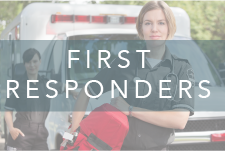The Link between PTSD and Substance Abuse
- Jan 23, 2022
- 6 min read
Updated: Aug 22, 2025

When someone is struggling with both post-traumatic stress disorder and a substance use disorder, they are dealing with a dual diagnosis. This condition is especially common among veterans and first responders due to their frequent exposure to traumatic situations. The substance abuse often begins as a way to self-medicate and cope with PTSD symptoms, but this can create a harmful cycle that worsens both conditions.
What is an example of a dual diagnosis?
A dual diagnosis is when a person has both a mental health disorder and a substance use disorder. For example, a veteran with post-traumatic stress disorder (PTSD) who also struggles with alcoholism is a classic example of a dual diagnosis.
The link between PTSD and substance abuse is a complex issue, but there are effective ways to treat both conditions simultaneously. Keep reading to learn more about different therapy types, the role of medication, and how to find the right treatment center for your needs.
Understanding the Link Between PTSD and Substance Abuse
Post-traumatic stress disorder, or PTSD, is a relatively common mental health condition that can develop after a person experiences or witnesses a traumatic event Symptoms can include reliving the event, avoiding reminders of the trauma, negative thoughts, and feelings, and increased emotional arousal (which might manifest as insomnia, angry outbursts, concentration difficulties, being easily startled, etc.).
Veterans active duty service members and First Responders are at higher risk of developing PTSD because of their exposure to dangerous situations. If you or someone you love is struggling with PTSD, it's important to seek help from a qualified PTSD and or substance abuse treatment center.
PTSD and Substance Abuse: Dual Diagnosis
There is a strong link between PTSD and substance abuse. In fact, dual diagnosis treatment centers report that up to 50% of all patients who seek treatment for addiction also have a mental health disorder.
This is not surprising when you consider the high levels of stress associated with both careers. First responders are constantly exposed to traumatic events, while veterans often return home from active duty with PTSD.
The good news is that dual diagnosis treatment can be successful. Several different modalities can be used, including CBT, EMDR, and brainspotting.
Treating both Mental Health and Substance Abuse
Group Therapy
Group therapy is a great way to provide support for people who are struggling with PTSD and substance abuse. In group therapy, participants meet in a safe and supportive environment to share their experiences and learn from each other.
The group leader will facilitate the discussion and help keep everyone on track. Group therapy can be very helpful in providing a sense of community and support.
Individual Therapy
Individual therapy is a one-on-one session with a therapist. This can be an excellent option for people who are struggling with PTSD and substance abuse. The therapist will work with the individual to develop a treatment plan that meets his or her specific needs.
The therapist will also provide support and guidance. Many people find individual therapy to be very helpful in managing their mental health and addiction.

Couples Therapy
Couples therapy is a type of therapy that is designed for couples who are struggling with PTSD and substance abuse. In couples therapy, the therapist will help the couple understand how both conditions are impacting their relationship.
The therapist will also provide tools and techniques for the couple to use in order to improve their relationship. Couples therapy can be very beneficial for couples who are struggling with PTSD and addiction.
Medication
There are a number of medications that can be used to treat both PTSD and substance abuse. This includes drugs such as antidepressants, anticonvulsants, and antipsychotics.
These medications can be very helpful in managing both conditions. It is important to work with a qualified psychiatrist to find the right medication for you or your loved one.
Recreational Therapy
Recreational therapy is a type of therapy that uses activities such as art therapy, music therapy, and hiking to help people who are struggling with PTSD and substance abuse.
These activities can be very helpful in managing symptoms of both conditions. They can also be a lot of fun!
What is an example of a Dual Diagnosis?
Let's take a look at an example of dual diagnosis. John is a veteran who has returned home from active duty with PTSD. He also struggles with alcoholism.
John's alcoholism is causing him to drink more and more in order to cope with his PTSD symptoms. This is leading to even more problems, including relationship difficulties and job loss.
John is a perfect example of someone who is struggling with dual diagnosis. He has both PTSD and alcoholism, which are impacting his life in a negative way.
Substance abuse is often a way for people to self-medicate when they are feeling stress, loss of appetite, or ruptured sleeping patterns. When someone is struggling with PTSD and substance abuse, it can be difficult to break the cycle.
Dual diagnosis symptoms may include these signs: Irritability, stress, loss of appetite, ruptured sleeping patterns social withdrawal, detachment. If you are struggling with PTSD and substance abuse, it is important to seek help. Treatment can be difficult, but it is possible to overcome these challenges. There are many resources available to help you get started.
The Important of finding a treatment center that is Dual Diagnosis focused
There are a number of different dual diagnosis programs that are available, and it is important to find the one that will be the best fit for you. Some programs focus on medication management, while others offer more holistic treatments like yoga or meditation.
It is important to find a program that feels safe and supportive, and that will help you to address both your mental health and your substance abuse issues.
Dual diagnosis treatment can be life-saving for those who are struggling with both PTSD and substance abuse. If you are experiencing these problems, make sure to reach out for help.
There is no shame in needing assistance, and there are many people who want to support you on your journey to recovery. Treatment can be the key to reclaiming your life and getting back to living a happy and healthy future.
If you or someone you know is struggling with PTSD and substance abuse, please reach out for help. There are many resources available, and there is no shame in seeking assistance. Dual diagnosis treatment can be the key to reclaiming your life and getting back to living a happy and healthy future.
Frequently Asked Questions
• What is a dual diagnosis?
A dual diagnosis is when an individual is struggling with both a mental health condition, such as PTSD, and a substance use disorder.
• How common is dual diagnosis in people seeking addiction treatment?
According to the provided text, up to 50% of all patients who seek treatment for addiction also have a mental health disorder.
• What types of therapy are used in dual diagnosis treatment?
Dual diagnosis treatment can include different modalities like CBT (Cognitive Behavioral Therapy), EMDR (Eye Movement Desensitization and Reprocessing), and Brainspotting.
• Can couples therapy help with PTSD and substance abuse?
Yes, couples therapy can be beneficial. It helps a couple understand how both PTSD and substance abuse are impacting their relationship and provides tools to improve it.
Is medication a part of dual diagnosis treatment?
Yes, several medications, including antidepressants, anticonvulsants, and antipsychotics, can be used to treat both PTSD and substance abuse.
We know the journey to recovery from PTSD and substance abuse can feel overwhelming, but you don't have to face it alone. At Chateau Health and Wellness Treatment Center, we are dedicated to providing the compassionate, expert care you deserve. Our team specializes in addressing the unique challenges of dual diagnosis, offering personalized treatment plans to guide you toward a healthier future. We are here to support you every step of the way. If you or someone you love is struggling, we invite you to take the first step with us. Please call us at (435) 222-5225 to learn how we can help you reclaim your life.

About The Author
Austin Pederson, Executive Director of Chateau Health and Wellness
Brings over eight years of experience revolutionizing mental health and substance abuse treatment through compassionate care and innovative business strategies. Inspired by his own recovery journey, Austin has developed impactful programs tailored to individuals facing trauma and stress while fostering comprehensive support systems that prioritize holistic wellness. His empathetic leadership extends to educating and assisting families, ensuring lasting recovery for clients and their loved ones.
Danny Warner, CEO of Chateau Health and Wellness
Brings a wealth of experience in business operations, strategic alliances, and turnaround management, with prior leadership roles at Mediconnect Global, Klever Marketing, and WO Investing, Inc. A graduate of Brigham Young University in Economics and History, Danny has a proven track record of delivering results across diverse industries. His most transformative role, however, was as a trail walker and counselor for troubled teens at the Anasazi Foundation, where he directly impacted young lives, a personal commitment to transformation that now drives his leadership at Chateau.
Ben Pearson, LCSW - Clinical Director
With 19 years of experience, Ben Pearson specializes in adolescent and family therapy, de-escalation, and high-risk interventions. As a former Clinical Director of an intensive outpatient program, he played a key role in clinical interventions and group therapy. With 15+ years in wilderness treatment and over a decade as a clinician, Ben has helped countless individuals and families navigate mental health and recovery challenges.









